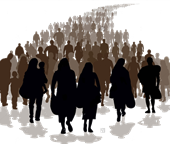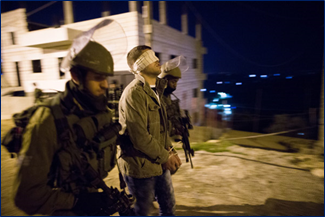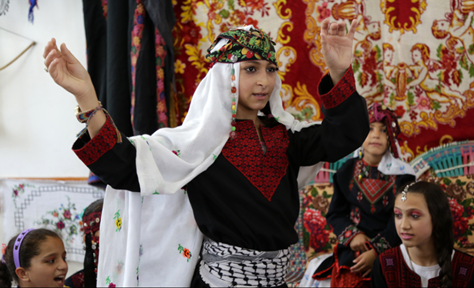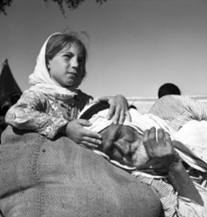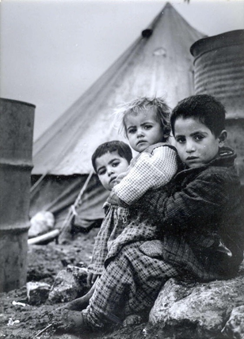Politics of Erasure: Israeli Prime Minister Calls for the Dismantling of UNRWA
|
Refugees and other registered persons eligible for UNRWA services 5.7 Million in 2015 5.4 Million in 2013 5.1 Million in 2011 Gaza: 1.3 Mio Gaza West Bank |
Israeli Prime Minister Benjamin Netanyahu called on Sunday, 11 June 2017, for the dismantling of the United Nations Relief and Works Agency for Palestine Refugees in the Near East (UNRWA) that currently provides assistance and protection to millions of Palestinian refugees, accusing it of anti-Israeli incitement. The Prime Minister asserted that he had already conveyed a related appeal to US ambassador to the United Nations (UN) Nikki Haley. Netanyahu’s call for the dismembering of UNRWA must be viewed as part of its larger attempts to permanently erase the Palestinian refugee problem from the UN agenda and from human memory.
Attack on UNRWA
The importance of UNRWA is tremendous. Established by the UN General Assembly in 1949 after the expulsion and flight of more than 700,000 Palestinians to primarily neighboring Arab states in the context of the 1948 war and Israel’s creation, UNRWA currently provides aid to five million registered Palestinian refugees1 in Jordan, Lebanon, Syria, and occupied Palestine.
UNRWA services are direly needed as the socioeconomic situation in refugee camps is poor and living conditions are marked by overcrowding and inadequate basic infrastructure and lacking services. In Lebanon, for instance, Palestinians are denied basic human rights, such as the right to citizenship and property rights. Refugees in occupied Palestine are subjected to violence and perilous socioeconomic conditions, particularly in the refugee camps in Gaza, caused by recurrent Israeli military operations and military raids in camps, sustained Israeli closures, the construction of illegal settlements and the Separation Wall, and the severe economic and movement restrictions that exacerbate unemployment and poverty among refugees. UNRWA distributes aid and emergency assistance and provides relief, education, health care, social services, and vital infrastructure to the millions of refugees and displaced persons forced from their homes as a consequence of the 1948 Nakba, the 1967 Naksa, and continuing Israeli violations.
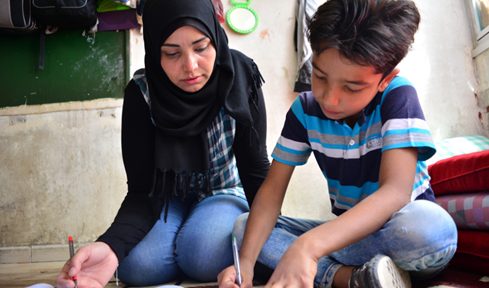
| UNRWA: On World Family Day in Syria, Education Is a Lifeline for Displaced Families Tabreez and her family, like thousands of Palestine refugees, have been displaced multiple times in Syria. Unable to afford housing costs, she and her sons live today in the UNRWA Haifa School collective shelter. UNRWA Haifa School collective shelter, Damascus, Syria. © 2017 UNRWA Photo by Taghrid Mohammad |
While UNRWA provides vital support and protection to Palestine refugees, Netanyahu claimed that the agency perpetuated, rather than “solved”, the Palestinian refugee problem during a weekly cabinet meeting and that it fueled incitement against Israel. Coming from a head of state whose government actively diminishes Palestinians’ inalienable political and human rights and whose policies undermine any just solution to the refugee question, this statement serves as reminder that Israel seeks to “solve” the issue by erasing the internationally recognized rights of Palestine refugees once and for all.
The Israeli Prime Minister moreover stated that “It is time UNRWA be dismantled and merged with the United Nations High Commissioner for Refugees”, Netanyahu stated. This statement is intolerable given that Palestinian displaced persons and refugees represent the largest and oldest case of displacement on the UN agenda and in the world today. It moreover neglects the persistency of refuge and forced displacement over seven decades resulting from longstanding Israeli violations.
Perilous Alliance in the Context of International Consensus
Meanwhile, the discovery by UNRWA of an alleged Hamas tunnel running underneath two schools in Maghazi Refugee Camp on 1 June, which was condemned by UNRWA in the strongest terms, served as absurd pretext for the Israeli government to further its longstanding campaign of erosion of the inalienable right of Palestine refugees.
Netanyahu reportedly conveyed to Nikki Haley that “it was time the United Nations re-examine UNRWA’s existence” during a meeting with the US envoy to the UN in West Jerusalem on Wednesday, 7 June. The appeal can be expected to acquire vogue with an ambassador who had priorly accused the United Nations of a “chronic anti-Israel bias” (6 June 2017, Human Rights Council).
Although the pledges of $368 million by Israel’s main ally, the US, amounted to the largest donations to UNRWA last year, the position of the US has been one of silent acquiescence to the Middle Eastern ally and economic, military, political and ideological support for Israel under all previous administrations. The alliance is now being embellished by more vigorous and outspoken support for Israel. Attempts to discredit the promotion of human rights and the rule of law as “anti-Israel” and politically motivated, to undermine Item 7 at the Human Rights Council, and to dismember this vital agency are part and parcel of the allied policy.
However, since the General Assembly is the only UN body that could alter UNRWA’s mandate on the basis of a majority vote, the politics of erasure should not proliferate given that the last extension of the agency’s mandate for three years proceeded by a large majority in December 2016. This internationally recognized mandate entails assistance to Palestine refugees for the achievement of their full potential in human development until a just solution to their situation is finally reached.
The Just Solution
This solution, which enjoys overwhelming international support, has long been outlined. Landmark General Assembly resolution 194 (III) of 11 December 1948 postulates the repatriation, resettlement, and economic and social rehabilitation of the refugees and their restitution, determining that “the refugees wishing to return to their homes and live at peace with their neighbors should be permitted to do so at the earliest practicable date, and that compensation should be paid for the property of those choosing not to return and for loss of or damage to property which, under principles of international law or in equity, should be made good by the Governments or authorities responsible”.
Resolution 237 passed by the Security Council on 14 June 1967 requests Israel to guarantee the safety, welfare and security of the inhabitants of the areas affected by military operations during the Six-Day War and subsequent hostilities and to enable the return of fled inhabitants. Following these and related resolutions and relevant provisions, the General Assembly regularly reaffirms the right of refugees and displaced persons to return to their homes or former places of residence in the territories occupied by Israel since 1967. Pending a just solution to their plight, UNRWA is mandated to help them achieve their full potential in human development.
The Plight of Palestine Refugees
With this year marking the 69th anniversary of the Nakba and half a century since the Naksa, Israel still denies the inalienable right of millions of Palestinians to return to their homes, contrary to international law and UN resolutions, notably General Assembly resolution 194 (III). Israel perpetuates the injustice through continued forced displacement through its recurrent military actions and its colonialist and apartheid activities disproportionately affecting the Palestinian population. In the meantime, accountability and compensation remain absent: Legal mechanisms under Israel’s military administration in occupied Palestine and under Israeli civil law in occupied East Jerusalem and Israel deny effective remedies for displacement and rarely provide compensation.
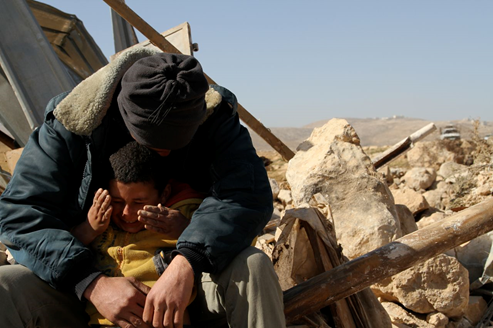
| A father and his son sit on the bricks of their home demolished by Israeli forces. |
Generations of Palestinians have lived in refugee camps in Jordan, Lebanon, Syria, and occupied Palestine all their lives. Many will die without having seen their homeland or original place of residence. In the absence of a just solution, Palestine refugees face immense suffering and deplorable conditions under occupation and in exile marked by vulnerability, dispossession, and a perilous socioeconomic situation – foremost due to the successive crises in Gaza and Syria.
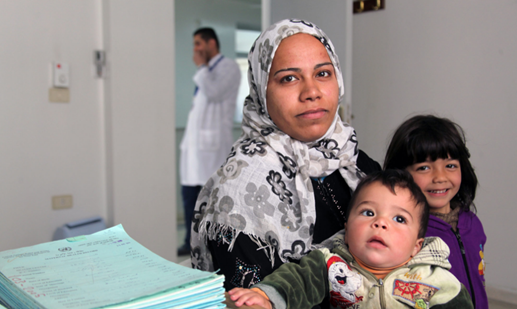
| UNRWA: Palestine refugees turn to alternative health points amidst the devastating Syria conflict. Safe access remains one of the greatest challenges for Palestine refugees seeking health services during the conflict in Syria. UNRWA remains committed to innovative solutions to ensure that all Palestine refugees have access to high quality health care. Qabr Essit, Damascus. ©2015 UNRWA Photo by Taghrid Mohammad |
Israel’s 2014 military offensive in Gaza has left deep marks on the Palestinian civilian population – particularly on refugees, many of whom have been forcibly displaced again. 14,000 refugee families were displaced as a result of the offensive and 6,750 Palestine refugee families (40000 individuals) remain displaced. UNRWA assists the victims of Israeli violations diligently.
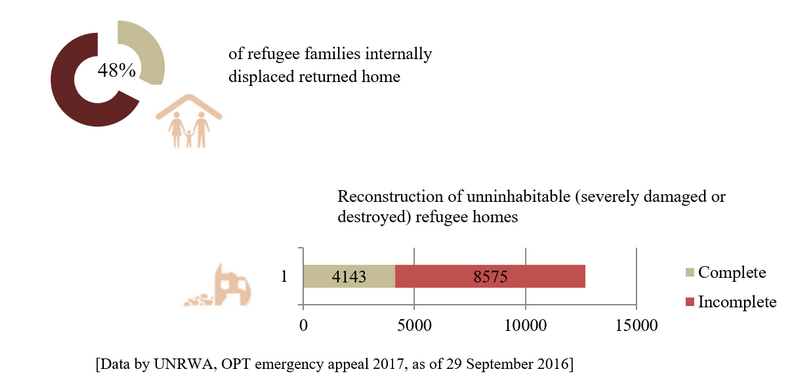
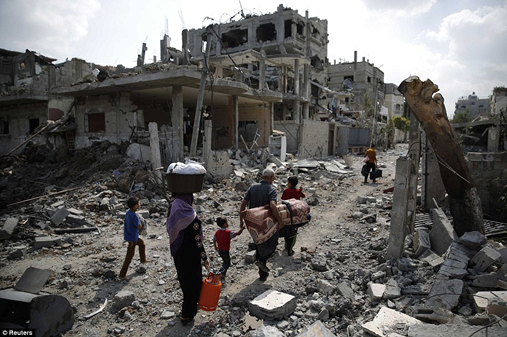
| A Palestinian family carries their belongings towards the remnants of their destroyed home after returning to the town of Beit Hanoun in Gaza during a ceasefire. [Reuters, 2014] |
Protection threats are also prevalent in the West Bank, with Israeli forces regularly targeting refugee camps. UNRWA reports about the following incidents at refugee camps in 2016:
|
• 5 refugees killed, including 1 minor • 577 search and arrest operations • 296 confrontations with live ammunition used in 95 instances • 70 settler-related incidents resulting in damage to Palestinian property or land • 28 settler-related incidents led to Palestinian casualties • 547 detentions, including 98 minors • 338 refugees injured, including 64 minors |
What the statistics cannot convey is the horror lived by Palestinian refugees during these operations. During nightly raids by Israeli forces in their camps and homes, they will open their eyes in the middle of the night to witness their friends or family members being harassed, violently handcuffed and dragged away to face incarceration, or even shot dead.
|
|
A Palestinian youth is arrested by Israeli forces during a nightly raid at Dheisheh refugee camp. |
Those left behind continued living with sorrow and pain. In 2016, Fawwar and Dheisheh refugee camps witnessed intensified operations by Israeli forces. A GICJ member visited a home in Dheisheh refugee camp by Bethlehem of a family that had lost a son the preceding year. The living room of the family was covered with memories and portraits of their son who had been shot by Israeli forces during a protest. Wassif, a family friend, described him as a young man who had been well known and loved by everybody at the camp, had always carried a smile on his face, and had had a recognized job at the Bethlehem hotel. According to Wassif, he had been a brave activist against the occupation until the last second, when he had been at the forefront of the youth directly facing the Israeli military. Throwing stones, which are hardly able to hurt heavily armed and shielded soldiers, was punished with death. The mom started crying at the memory of her son and Wassif brought her a paper towel. Reverberate silence filled the room for a moment. This silence conveyed a faint idea of the suffering and sorrow lived by many refugee families in occupied Palestine and beyond, whose prospects of returning to the place of their forefathers, of choosing where to live, or of simply living in a safe and peaceful home dwindle with every passing day, year, and decade. UNRWA leaves a little beam of hope in the eyes of many.
|
|
| “Feeling Like a Bird in the Sky” – UNRWA Summer Fun Weeks in Gaza Eleven-year-old Amera al-Loul was introduced to her own cultural heritage through the SFWs. “I am excited to experience some of our grandparent’s traditions, such as the social ritual of the Palestinian wedding party,” said Amera. “We sing traditional songs, we laugh and we dance and this makes us happy.” © 2016 UNRWA Photo by Roshdi al-Sara |
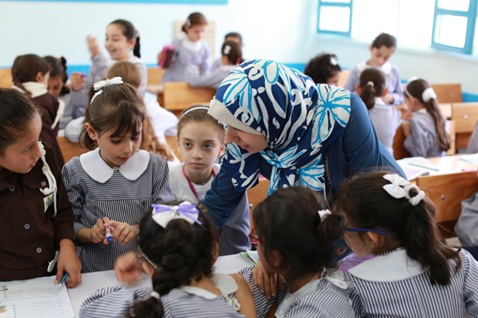
| UNRWA teachers and students share their thoughts on how the education reform improved their experience in the classroom “The Education Reform training programmes enhanced my teaching practices by rearranging the students in the class, group work and increasing students’ participation in learning,” says Fatima Akram Haraz Allah, an elementary teacher in Gaza. “Children now ask, discuss and hold their own opinions. I feel happy as our children are better prepared for the future.” © 2016 UNRWA Photo by Rushdi al-Sarra |
Notwithstanding Israel’s incessant attempts to efface Palestinian collective memory of their homeland and to erode the rights of Palestinian refugees and displaced persons, including the right to return, GICJ reaffirms its position that these rights do not diminish with the passage of time and remain cornerstone of a future solution to the Palestine question. We therefore call upon the international community to:
• Take a firm stance against Israel’s continued attempts to negate Palestinian inalienable rights, including the right of return and the right to self-determination in their independent State of Palestine.
• Increase their support of and contribution to UNRWA, without which the suffering of Palestinian refugees and displaced persons would be further exacerbated and the human rights of all persons in the region would further erode.
|
|
|
||
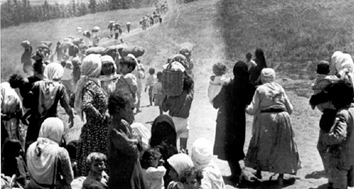 |
1. UNRWA defines a “Palestine refugee” as a person “whose normal place of residence was Mandatory Palestine between June 1946 and May 1948, who lost both their homes and means of livelihood as a result of the 1948 Arab-Israeli conflict”. UNRWA assists all “those living in its area of operations who meet this definition, who are registered with the Agency and who need assistance” and those who became refugees as a result of the 1967 Six-Day War, regardless if they reside in designated Palestine refugee camps or in other permanent communities.
Read online or download the full report.
النص بالعربية: هنا
GICJ Activities on the Human Rights situation in Palestine and other occupied Arab territories
GICJ Urgent Appeals on Palestine:
- GICJ - Punishing people for the misdeeds of others clearly violates international law - July 2014
- A match in the powder keg: The occupying force continues to contravene international law - April 2014
- GICJ – Urgent Appeal on the Forcible eviction of Ein Hijleh - February 2014
- UN press release on behalf of Issa Amro - September 2013
- GICJ –Urgent appeal following arbitrary arrest of Sireen Khudiri - June 2013
- GICJ – Follow-up appeal on behalf of HR defender - June 2013
- GICJ - Follow-up appeal on the case of Mr. Issa Amro - April 2013
- GICJ - Urgent Appeal to the Special Rapporteur on the situation of human rights defenders - March 2013
- GICJ – Urgent Appeal to the UN Special Rapporteur on the situation of human rights in Palestinian territories occupied since 1967 - February 2013
GICJ Side-Events and oral statements on Palestine:
Human Rights Council - 30th regular session (14 September - 2 October 2015)
Human Rights Council - 29th regular session (15 June - 3 July 2015)
Human Rights Council - 21st special session on the human rights situation in the Occupied Palestinian Territory, including East Jerusalem (23 July 2014)
Human Rights Council - 26th regular session (10 - 27 June 2014):
Human Rights Council - 25th regular session (3 - 28 March 2014):
Human Rights Council - 24th regular session (9 - 27 September 2013):
- Side-event: Human Rights in Palestine - Palestinian Refugees in Diaspora and their Right of Return, Where to?
- Side-event: Human Rights in Middle East - Give Peace a chance
- Democracy and the Right to self-determination
- GICJ statements on Palestine
Human Rights Council - 23rd regular session (27 May - 14 June 2013):




